And so the unimaginable happened — the result of the Philippines’ long-awaited 2022 presidential elections is that Ferdinand “Bongbong” Marcos Jr., son of the former dictator Ferdinand Marcos Sr., will becoming the country’s 17th president, succeeding the controversial Rodrigo Duterte in June. Marcos Jr.’s victory in one of the Philippines’ most consequential elections since the 1986 People Power Revolution brought back democracy to the country after 21 years of Marcos Sr.’s rule — 14 of them under martial law — has alarmed people who lived through one of the darkest periods in Philippine history.
After more than three decades, however, the historical memories which could have prevented the return of another Marcos to power were lost to an assiduous and systematic revisionist campaign successfully orchestrated by the Marcos team, using different social media platforms. The efforts, reported to be a decade in the making, led to an unprecedented landslide victory for Marcos with over his nemesis, Vice President Leni Robredo, and the other candidates.
As Ferdinand Marcos Jr. prepares to assume office, what is in store for the Philippines?
Political dynasties vs. People Power 2.0
The 2022 presidential elections forced the Filipinos to confront their checkered historical understanding of the Marcos martial law regime in early 1980s, known for its human rights abuses and corruption which bankrupted the country and made the Philippines the “sick man of Asia.” The elections also saw a replay of contests of political dynasties. On one side is Marcos Jr. and Vice President-elect Sara Duterte (daughter of the current president), and on the other is the reformist group led by Robredo. During the 2016 elections, Robredo faced off with Marcos Jr. in the contest for the vice presidency and won. Robredo represented the Liberal Party of then-President Benigno “Noynoy” Aquino Jr., son of Benigno “Ninoy” Aquino Sr., the archrival of Marcos Sr.
Aquino Sr. was assassinated in 1983 upon his return to the Philippines from exile in the United States. His death triggered massive demonstrations across the country, led by his widow, Corazon “Cory” Aquino, and culminated in the People Power Revolution that led to the ouster of Marcos Sr. in 1986, forcing the dictator and his family to live in exile in Hawaii. Corazon Aquino was elected president the same year. Marcos Sr. died in 1989 and his family was allowed to return to the Philippines in 1992.
Since 1992, the Marcos family had made no secret of its plans to reclaim political power and influence and reestablish the so-called Marcos “legacy.” Marcos Jr., was elected governor in the family’s bailiwick northern province of Ilocos Sur in 1992, became a senator in 2010, and ran for the vice presidency in 2016 only to lose to Robredo. Despite Marcos Jr.’s defeat, his vice-presidential bid was said to be a dry run for a presidential campaign in 2022. Having prepared the groundwork much earlier, Marcos clearly had the advantage over Robredo and other opposition candidates. His strategic partnership with Sara Duterte as a running mate (though the positions are elected separately) allowed him to significantly strengthen his support base. In contrast, Robredo’s presidential bid came late and was under resourced, relying more on grassroot support and volunteerism. And while the Robredo campaign may have captured the hearts and minds of hundreds of thousands of her supporters who came in droves to her “pink” rallies organized by mainly young people, drawing comparisons to the “yellow” People Power rallies in 1986, it was dwarfed by the immensity and the reach of the Marcos-Duterte resources. With a head start, massive resources, and the strategic partnership with the Dutertes backed by a strong political machinery, Marcos Jr.’s victory was not unexpected. With a decisive mandate, Marcos Jr. is now set to reverse his family’s fortunes. He has promised to bring back the “good old days” of the old Marcos regime, which according to his revisionist campaign was prosperous and stable.
How will Marcos govern
Apart from the dark pall cast over Marcos Jr.’s presidency by his family’s history of repression, cronyism, and kleptocracy, much of the concern expressed not only by the opposition but also particularly by certain quarters of the Philippines’ policy community, have much to do with the lack of clarity of his platform. With the candidate having snubbed all presidential debates, many are left guessing how the Marcos administration is going to address the many challenges facing the Philippines. There are also fears that with Sara Duterte as vice president, Marcos Jr. will protect his predecessor from investigations and possible prosecution for human rights violations and extrajudicial killings carried out during his “war on drugs” policy.
To be sure, Marcos Jr.’s simple message of “unity” conveyed throughout his campaign has failed to outline any concrete policies on how, for example, he is going to steer the country into economic recovery after the devastating impact of the COVID-19 pandemic. Other pressing issues — like the growing food crisis, compounded by the ongoing war in Ukraine; water and resource scarcity; growing energy demands; and the urgent need to marshal adequate resources to address the multifaceted impact of climate change on people’s safety from more frequent and severe natural disasters — also need clear policy direction.
Philippine foreign policy
It is not only the lack of information on Marcos Jr.’s plans for governing the country that is worrying. Foreign policy was basically absent from his campaign. This lacuna is particularly concerning given the critical issues affecting the country’s security and its relations with the United States, China, and its Association of Southeast Asian Nations (ASEAN) neighbors.
One of these issues is the future of the West Philippines Sea, the official designation by the government of the Philippines of the parts of the South China Sea that are included in the country’s exclusive economic zone, and China’s refusal to respect the arbitral ruling that gives Philippine sovereignty over this disputed territory. The outgoing Duterte administration has taken a non-confrontational approach toward China and to a certain extent adopted an almost fatalistic attitude on the West Philippine Sea issue, choosing instead to lean more on Beijing’s promise of more trade and investments to the country. Marcos Jr. is reported to want to continue with Duterte’s friendly policy toward China, and has declared that the country should “engage with China” to the fullest, while careful at the same time not to get drawn into U.S.-China competition.
This brings to question how Marcos Jr. would deal with the U.S. and the future of the U.S.-Philippine alliance. During the old Marcos regime, the military partnership remained resilient despite vocal U.S. opposition to martial law, even after the assassination of Aquino Sr. Although the strategic environment has significantly changed since the 1980s, one would expect more continuity than change in U.S.-Philippines relations. And unlike President Duterte who had borne a personal grudge against the U.S. and was vocal about it, Marcos Jr. has no known baggage. Given Marcos Jr.’s “cosmopolitan” background, he would perhaps be less insular and more inclined to pursue closer relations with the U.S. while adopting a balanced position in dealing with the U.S.-China rivalry. Moreover, most Filipinos have a more favorable view of the U.S. than China. Given the kind of transnational economic and security challenges facing the Philippines, one would also want to see whether and how the Marcos administration will support multilateralism both regionally and globally.
While the Philippines’ ASEAN neighbors may be too preoccupied with their own problems, particularly as they emerge from the brunt of the pandemic, it would be interesting to see how they will engage with the new Philippine administration. That Marcos Jr. was democratically elected regardless of his political baggage is a welcome development for ASEAN, particularly when stacked against the ongoing crisis in Myanmar. With pronouncements of returning the Philippines to its “past glory” as a leading country in Southeast Asia, Marcos Jr. may want to be seen as being more present than Duterte in ASEAN meetings and add his country’s voice to regional and global issues. Many of Marcos Jr.’s foreign policy decisions will also depend on who he brings into his cabinet, particularly in the foreign policy and defense portfolios.
As Marcos Jr. takes over the presidency in June 2022, many questions remain. Will he provide a better life for Filipinos and unite a polarized country? Can he allay growing fears about the return of dictatorship, and guarantee that human rights will be protected and democracy will prevail? Will he ensure that the country’s sovereignty and national interests will not be compromised vis-à-vis worries of Chinese aggression? Can he restore confidence and assure the country’s external partners, particularly the U.S. and Japan, of the Philippines’ commitment to a rules-based international order? With many more questions to come, time will tell if Marcos Jr. will rise to the occasion.
The Brookings Institution is committed to quality, independence, and impact.
We are supported by a diverse array of funders. In line with our values and policies, each Brookings publication represents the sole views of its author(s).

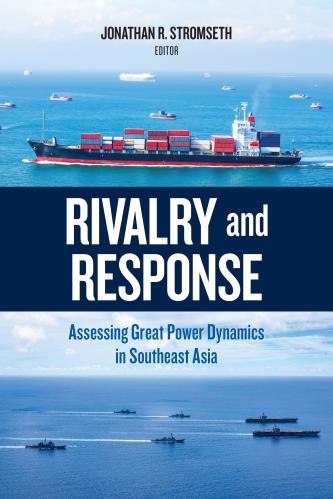
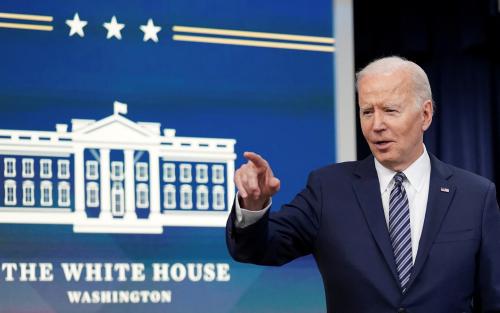
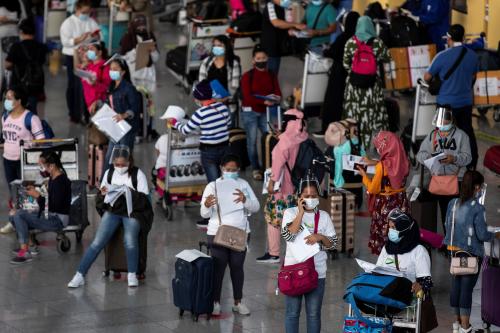


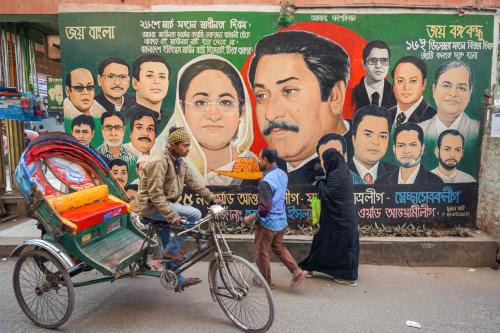
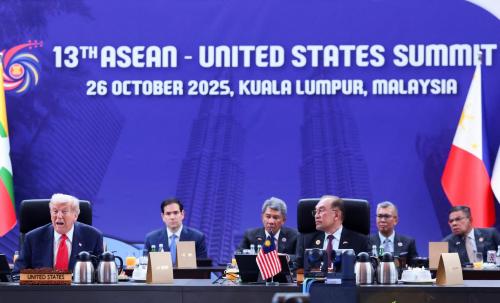
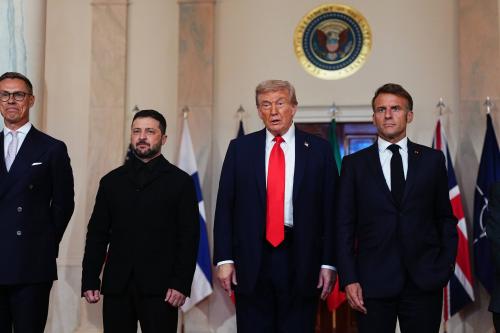
Commentary
A Marcos returns to power in the Philippines
May 13, 2022